Learn more about health with this collection
How to manage anxiety and self-doubt
Strategies for setting realistic goals
The importance of self-compassion and self-care
The start of mechanical digestion
One remarkable ability of the human body is changing food into nutrients, allowing us to survive and thrive.
When we eat food, it ends up in our digestive system that is composed of several organs. The goal is to turn the food into nutrients.
- Mechanical digestion starts in the mouth, where food is chewed into small pieces and mixed with saliva.
- When this mass (the bolus) lands in the stomach, it is acidified and further pressed until it becomes a liquid paste called chyme.
127
2.39K reads
Chemical digestion of food
Saliva and gastric acid contain enzymes that break the chyme down further with a process called chemical digestion, where our body further breaks everything we eat into small absorbable molecules.
The bolus keeps being pushed through the intestines and broken down by enzymes and other substances. Other organs also contribute to breaking the digested food into nutrients, which are then absorbed through the intestinal villi and sent to the bloodstream.
81
442 reads
The energy inside the body
- Adenosine Triphosphate (ATP): Our bodies need energy. We get this energy through a pathway called metabolism. ATP is the most common "currency" used to trade energy between cells. ATP is a small coenzyme the cells in our body use as an energy source in most of their processes.
- The Krebs Cycle: The body produces ATP through a series of biochemical reactions called the Krebs Cycle. It starts with Acetyl-CoA molecules. During the reactions, the energy inside this molecule is set free to produce ATP.
84
343 reads
How nutrients change into energy
- The foods we eat are broken into three basic units: carbohydrates, fats, and proteins. They form the macronutrients.
- The macronutrients need to be further broken into simpler units that will be used to produce Acetyl-CoA.
- There are three metabolic pathways: Glycolysis pathway breaks down carbohydrates, Beta-oxidation breaks down fats, and Transamination breaks down proteins.
- The body converts fats, proteins and other substrates into glucose through Gluconeogenesis.
84
319 reads
Storing energy for building
Glucose is the primary "fuel" that produce energy.
- Fats are packed into small units called lipoproteins and stored as body fat for later use.
- Proteins are broken into amino acids used to build new proteins, enzymes or tissues, such as muscle tissue.
- Amino acids and proteins are still available to be converted into glucose or used as a source of energy through the Transamination metabolic process.
- This glucose is stored in the muscles as glycogen.
While fasting, the body consumes the glycogen first, then fats, then proteins.
85
281 reads
ATP can be compared to electric energy
Electricity can light your lamps or power your appliances. But electricity needs to be produced first. We need a fuel that can be converted into electricity, such as petroleum (carbohydrates) that is converted into gasoline (glucose). Or solar energy (fats) or wind power (proteins).
We store the petroleum in warehouses (adipose tissue) for later use. The energy produced by electricity is used to build new materials (amino acids) and used to construct bridges or houses (muscular tissue).
81
312 reads
CURATED BY
More like this
3 ideas
Is fasting good for you? - BBC Science Focus Magazine
sciencefocus.com
3 ideas
The Bittersweet Truth of Sweet and Bitter Taste Receptors
sitn.hms.harvard.edu
19 ideas
Brain Food Summary
fourminutebooks.com
Read & Learn
20x Faster
without
deepstash
with
deepstash
with
deepstash
Access to 200,000+ ideas
—
Access to the mobile app
—
Unlimited idea saving & library
—
—
Unlimited history
—
—
Unlimited listening to ideas
—
—
Downloading & offline access
—
—
Personalized recommendations
—
—
Supercharge your mind with one idea per day
Enter your email and spend 1 minute every day to learn something new.
I agree to receive email updates

